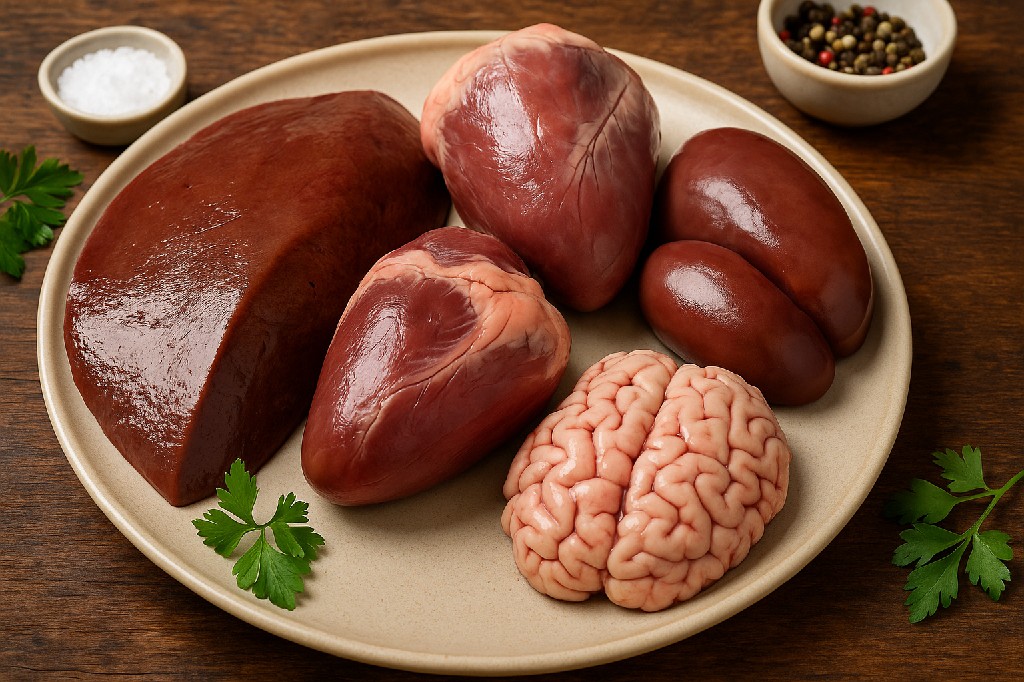Are Organ Meats Healthy to Eat?
Organ meats, also known as offal, include liver, heart, kidneys, and more. But recently, people have started to ask: are organ meats healthy to eat? This question is gaining attention as more individuals explore traditional nutrition. In this article, we’ll dive into the facts, explore their benefits, examine risks, and explain how to add them to your diet.

Are Organ Meats Healthy to Eat?
This question might seem simple, but the answer depends on context, quantity, and the individual. When consumed in moderation, organ meats can be incredibly beneficial thanks to their concentrated nutrients. However, overconsumption or poor sourcing can lead to potential issues.
What Exactly Are Organ Meats?
Organ meats come from internal animal organs such as the liver, heart, kidneys, brain, and tongue. For centuries, these cuts were considered valuable and often consumed before muscle meat. Today, they’re regaining popularity among those seeking nutrient-dense, ancestral diets.
Organ Meats: Nutritional Power
From a nutritional perspective, are organ meats healthy to eat? Yes. They’re rich in essential vitamins, including B12, A, D, and K2, as well as minerals like iron, zinc, and selenium. Liver, for instance, contains up to 6,000% of the RDA for vitamin A per 100g.
- Liver: High in retinol (active vitamin A), folate, and iron.
- Heart: Rich in CoQ10, B vitamins, and taurine.
- Kidneys: Full of selenium and anti-inflammatory fats.
- Brain: Packed with omega-3s and phosphatidylserine.
Because these nutrients are bioavailable, your body absorbs them more efficiently than from plant-based sources.
Organ Meats: Benefits Breakdown
So, what are the major benefits? Let’s explore them in detail:
Energy and Vitality Boost
One of the best answers to “are organ meats healthy to eat” is their impact on energy. High levels of B vitamins, especially B12, support metabolism, reduce fatigue, and improve mental clarity.
Support for Heart and Brain Health
Beef heart is a potent source of CoQ10, which supports cardiovascular function. Meanwhile, the brain contains healthy fats and nutrients critical for cognitive health and memory.
Improve Immunity and Skin Health
Thanks to zinc, vitamin A, and iron, these meats can enhance immunity, support reproductive health, and improve skin tone and elasticity.
Eco-Friendly and Nose-to-Tail Nutrition
Consuming the whole animal reduces food waste. It’s not only ethical but also environmentally friendly. That alone helps support the argument that are organ meats healthy to eat also includes sustainable living.
Are Organ Meats Healthy to Eat for Everyone?
While there are many upsides, it’s essential to consider the potential drawbacks.
Vitamin A Toxicity Risk
Although vitamin A is crucial, too much, especially from liver, can lead to toxicity. Symptoms may include nausea, joint pain, and fatigue. Therefore, liver should be eaten in moderation, particularly by pregnant women.
Cholesterol and Saturated Fat Content
Organ meats are rich in cholesterol and fat. While dietary cholesterol has a lesser impact than once thought, individuals with cardiovascular conditions should consult their doctor first.
High Purine Content
Kidneys and liver are high in purines, which can worsen gout. If you’re prone to uric acid buildup, moderation is key. This consideration shapes the answer to are organ meats healthy to eat for specific health conditions.
How Often Are Organ Meats Healthy to Eat?
You might now wonder how often to eat these foods. Most health experts agree that 1–2 servings per week are sufficient to gain benefits while avoiding excessive intake of fat-soluble vitamins.
Are Organ Meats Healthy to Eat When Cooked Properly?
Cooking methods play a major role in whether are organ meats healthy to eat or not. Grilling, sautéing, and slow-cooking are great options, while deep-frying can reduce nutritional value and add unhealthy fats.
Start With Milder Organs Like Chicken Liver
For beginners, chicken liver is affordable, mild in flavor, and easy to prepare. You can mix it into pâté or stews to gradually get used to the taste.
Blend Organs into Ground Meat
A practical way to include them is by mixing small amounts of liver or heart into ground beef. This reduces strong flavors and ensures even picky eaters can enjoy the benefits.
Cultural History: Are Organ Meats Healthy to Eat Traditionally?
Across the globe, traditional diets answer the question “are organ meats healthy to eat” with a resounding yes. In Asia, organs are part of daily cuisine. In France, foie gras is a delicacy. In Africa, stewed organ meats are staples for family meals.
Who Should Be Cautious With Organ Meats?
While most people benefit from them, a few groups should limit consumption.
Pregnant or Breastfeeding Women
Due to high vitamin A levels, especially from liver, pregnant women should limit intake unless directed otherwise by a healthcare provider.
People With Kidney or Gout Issues
Those with kidney conditions or gout may find that organ meats exacerbate their symptoms, particularly due to purines and minerals.
Individuals on Iron Supplements
Liver is rich in heme iron. If you are already supplementing with iron, be cautious not to exceed recommended levels, as iron overload can damage organs.
Final Thoughts
In summary, are organ meats healthy to eat? Yes, they offer unmatched nutritional benefits. They’re nutrient-dense, affordable, and sustainable. However, they must be eaten in moderation and sourced responsibly.
With the right approach, you can enjoy these traditional foods as part of a modern, healthy lifestyle.
Conclusion
Organ meats are making a comeback, and for good reason. Now that you’ve explored all aspects of the question, are organ meats healthy to eat, you understand both their power and their pitfalls. When consumed wisely, these foods can nourish your body in ways few other ingredients can.
Don’t let cultural bias or outdated views steer you away. Start small, be consistent, and enjoy the benefits nature intended.
